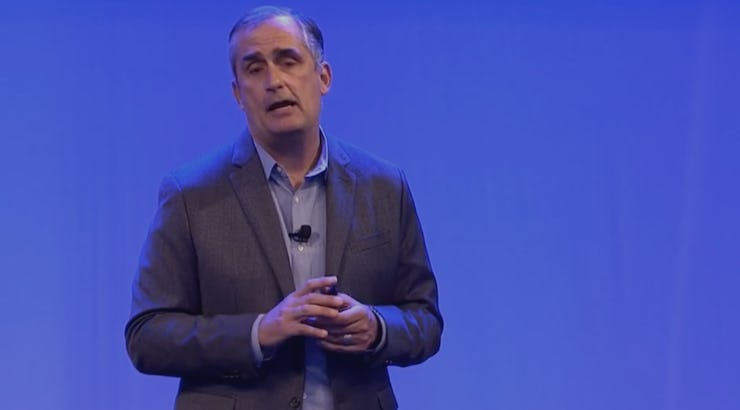Intel CEO Brian Krzanich laid out four big challenges that lie between the auto industry and a future filled with autonomous cars during a presentation at the LA Auto Show on Tuesday.:
In no uncertain terms, those data-centric challenges are:
- Size: Managing millions of hours of captured data
- Speed: How quickly can recorded data be processed
- Secure Sharing: How to keep driver and car data secure
- Scalability: Increasing requirements around data center scaling
Naturally, Intel thinks it can provide technology solutions the help overcome those challenges, but Krzanich, during his presentation on Tuesday at the LA Auto Show, urged that collaboration in the hyper-competitive automotive business is going to be required.
“Data is the new oil”
This need for collaboration is why Krzanich named his presentation, “Data is the new oil.” In his view, data should be a neutral resource, like oil. But when car companies can make their own data, they might be resistant to share, especially if it means a competitive edge.
So while we’re very close to autonomous travel becoming an everyday, routine experience, Krzanich offered a harsh assessment to his gathered audience of automotive industry employees.
“I’m going to be honest, this industry still has challenges,” Krzanich said. “This isn’t a done deal. There’s a lot of technology that has to be developed.”
Autonomous driving's four data roadblocks, as presented by Intel CEO Krzanich.
“Data will make a profound effect on the future of the driving experience,” Krzanich said, explaining that a fully autonomous car will generate as much data as 3,000 people.
“Let’s assume that by 2025, there’s a million autonomous cars out there driving on the roads,” Krzanich extrapolated. “Remember there’s many times that number of cars sold each year. I’m talking about a small percentage of cars and that’s going to be equivalent to 3 billion people’s data every day.”
Three Types of Data
Krzanich broke down the three types of data that any car needs. First, there’s technical data — how your car interacts with the road and its environment. Then there’s societal and crowd-sourced data like traffic conditions (Traffic app Waze is an example). Finally, and perhaps most compelling for auto execs looking for a competitive edge, there’s personal data.
“Whoever has the best and most of this type of data will be able to have the best applications, will be the best resourced to be able to provide that type of user interface and convenience,” he said.
He then offered this dreamy example: “If you like to watch adventure movies while you drive, it will show adventure movies.”
Krzanich touched on security — how do you keep your car’s programs from being hacked? “The car is especially a place we want to make sure is secure,” he said. “We believe that to do this, it’s going to take the industry coming together and collaborating. No one company will able to provide all the security solutions.”
He also announced today that Intel Capital spend more than $250 million over the next few years toward “this collaborative workplace, toward this place where anybody can share this data and share this security where it’s open to allow the whole industry to rise up.”
He observed that in his 34-year career he’s seen that “innovation and great changes only come when great companies work together. At Intel, we’re excited to be a part of it with the automotive industry.”
He didn’t take any questions but ended with this: “We truly believe that data is the next oil.”
